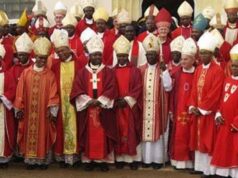
The Punch, Editorial
THE Presidency triggered a needless controversy recently with its brash intrusion into the legitimate efforts by the Ondo State Government to secure the lives and property of residents. In an unseemly and swift reaction to an order by Governor Rotimi Akeredolu to cattle herders to vacate the state’s forest reserves that had become hideouts and bases for kidnappers and killers, a presidential spokesman, Garba Shehu, weighed in to equate the action to ethnic profiling and a violation of the herders’ constitutional right to free movement. The intervention is wrong on all fronts. It lays bare the rabid sectionalism of the regime of the President, Major General Muhammadu Buhari (retd.), its disdain for federalism and how it is ill-suited to crush the rampaging insecurity assailing the fabric of the republic.
Unerringly, the regime never misses an opportunity to promote the interests of the Fulani ethnic group over and above those of other Nigerians. Ondo, like other South-West states, has been under siege from armed herders, mostly identified as Fulani both local and foreign, but also other groups. Security reports indicate that criminals have joined to pose as herders; they invade, destroy farms with their cattle, kidnap, kill, rape and burn homes and property. Invariably, they occupy the lush forests of the region where they have set up camps to coordinate their kidnapping of victims.
Contrary to the Presidency’s false messaging, Akeredolu did not give a blanket expulsion order. The eviction notice was restricted to the state’s forest reserves, protected areas which no one has a right to occupy. “All forest reserves in the state are to be vacated by herdsmen within the next seven days…,” Akeredolu said. Unambiguously, he explained that it was part of steps to address “the root cause of kidnapping, in particular, and other nefarious activities detailed and documented in security reports, the press and debriefings from victims of kidnap cases in Ondo State.”
“These unfortunate incidents are traceable to the activities of some bad elements masquerading as herdsmen. These felons have turned our forest reserves into hideouts for keeping victims of kidnapping, negotiating for ransom and carrying out other criminal activities.” This is clear enough. And his assertion that as the Chief Law and Security Officer of the state, it is his “constitutional obligation to do everything lawful to protect the lives and property of all residents of the state,” cannot be faulted.
Curiously, in its haste to play the role of champion of the Fulani, the Presidency falsely presented the action as seeking “…to unilaterally oust thousands of herders who have lived all their lives in the state…” There is nothing in the governor’s statement that suggests that. He only rightly ordered illegal occupants out of forest reserves.
Nature or forest reserves are protected areas for flora, fauna or geological interest designated by national or subnational governments for conservation of nature and resources. The International Union for Conservation of Nature says governments keep out human presence from reserves to prevent exploitation of natural resources through grazing, for firewood, fauna and others. Federal and state governments in the United States, Canada, Russia and Australia maintain many. Egypt has 30 covering 12 per cent of its entire territory; Russia has 100 and South Africa’s 20 national parks approximate to about 3.0 per cent of the country’s land area.
All over civilised societies, reserves are not for unauthorised grazing or settlements. Olu Falae, an elder statesman, who has twice been kidnapped and ransomed, as well as lawyers, say the Forest Reserve law and the 1999 Constitution that vests control and use of land on state governors are enough to curb the primitive, crude and intrusive practice of open grazing.
By virtue of their protective status, the Food and Agricultural Organisation of the United Nations says forest reserves should remain free from destructive human intervention. There are about 1,129 forest reserves, 29 game reserves, four game sanctuaries and four national parks in Nigeria. The position of the law is that local governments are responsible for the administration of Communal Forest Areas, the state governments control and manage forest reserves, game reserves and game sanctuaries. The Federal Government, under the Exclusive Legislative list, is only responsible for the control, protection and management of national parks. States and the FCT each have an established forestry services division under the appropriate ministry. Each state forest service is responsible for setting and administering policies for its forests. It, therefore, becomes a dangerous national security issue when a government abjures law and order to profess tacit support for criminality. It would have sounded precariously odd if the Olusegun Obasanjo administration had gone out of its way to defend the O’odua Peoples Congress violence or the Goodluck Jonathan government justifying the Niger Delta militants’ bombings and killings. But on Buhari’s watch, this country has never been this awfully governed.
Truly, Nigeria is dysfunctional. Every issue is politicised and ethnicised, making it difficult to unite to defeat common security threats. The imprudent statement by the Northern Elders Forum to herders to disobey the quit order sets the stage for further polarisation. For them, fealty to ethnic identity overrides rational, empirical and scientific considerations, human lives and the country. Reactively, South-West groups are also rallying in support of the governor.
Yet, Buhari, state governors and senior officials and credible intelligence reports have repeatedly admitted that many of the killer herdsmen are not even Nigerians. Global bodies, including the International Crisis Group, say that the country is flushed with weapons from imploding Libya, Mali and other Sahelian countries. And that fleeing desertification in the Sahel region, militants have mixed with herdsmen, jihadists and bandits to flood Nigeria.
And is the resultant effect? The far North has become a vast killing field, the Middle Belt smouldering while the South-West is crumbling too. Apart from frequent attacks on farmers, destruction of farms, kidnapping and rapes, local vigilance groups report the presence of well-armed herdsmen and kidnappers’ camps in the region’s forests and reserves. Freedom of movement is not a licence to perpetrate crime. Everywhere else, there would be a national consensus to crush criminality.
Buhari’s regime is however duplicitous, declaring on the one hand that bandits are mostly foreigners, but on the other, rushing to their defence whenever their victims react. No country can defeat insecurity this way. Meanwhile, the same regime allows its police to enforce discriminatory, unconstitutional religious Sharia penal law in 12 northern states, destroying alcoholic bottles and investments of non-Muslim business people in a country that claims to be democratic, multi-religious and multi-cultural. Where is the ideal of unity in diversity in all of this?
Cattle rearing is a business like any other; it is not superior to other enterprises. It is intolerable that the Federal Government reinforces the odious culture of entitlement of herdsmen to other people’s land and their willingness to “draw from a pool of violence” as Catholic cleric, Hassan Kukah, labelled it, to enforce that claim.
This is not Akeredolu’s or Ondo State’s fight alone; it is a struggle for every right-thinking citizen of this country. Martin Luther King Jr. said, “Injustice anywhere is a threat to justice everywhere. We are caught in an inescapable network of mutuality, tied in a single garment of destiny. Whatever affects one directly, affects all indirectly.” Nigerians should push back against a Presidency fixated on an ethnic, sectional agenda that treats other Nigerians as second class citizens to be subordinated to the interests of local and foreign cattle herders converging on the country from all over West and Central Africa.
Nigeria’s reality as a disparate amalgam of many nationalities, cultures and interests is daily amplified under Buhari’s divisive watch. Akeredolu and South-West states should not buckle to the harassment and threats. Regional and state security agencies like the South-West’s Amotekun should be strengthened. Open grazing should be banned completely and the rules enforced. Like every other business and social activity, cattle grazing should be regulated, restricted to enclosed and designated areas and carrying of arms prohibited. Institutional laxity that allowed illegal herders, loggers and criminals to flourish in protected reserves to the point of becoming existential security threats should be arrested and the heritage sites effectively managed. Akeredolu and indeed the governors that take the security and welfare of their people as sacrosanct, have the constitution and the law behind them. The task is to use the law to fight crime without fear or favour, religious prejudice or ethnic profiling.



















































